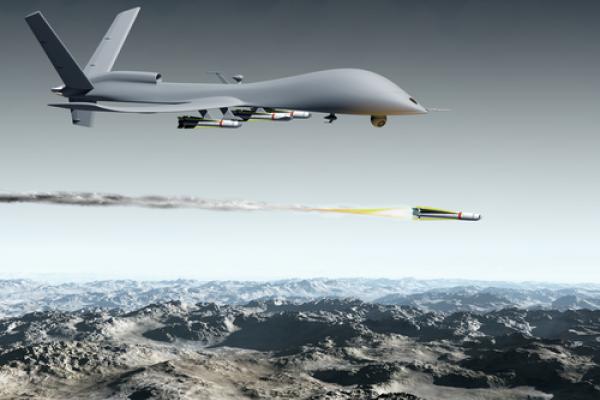Editor's Note: The following is an open letter/response to Liberty University with respect to the institution’s School of Aeronautics (SOA), which trains Christian students to pilot armed U.S. drones. To find out more about Liberty’s SOA see David Swanson’s article in the July 2013 issue of Sojourners magazine, ”Drones for Christ.”
Dear Liberty University,
I want to write truthfully about God. I know many will find that an odd way to begin a letter about U.S. drone warfare, but I see no other way. After all, I am a Christian — I cannot hope to transcend that identity, nor do I think that attempting to do so is a worthy goal, especially for the sake of "objectivity". Indeed, being a Christian inevitably means many things — it means being baptized, partaking of the Lord's supper, and belonging to a community marked by the confession that Jesus Christ is Lord. Likewise, being a Christian means lamenting the violence carried out by those powers and principalities that coercively seek their own lordship over God's good creation — powers and principalities like America.
This morning, I was discouraged to read that Liberty University has been training Christians to pilot armed U.S. drones since 2011 in your School of Aeronautics (SOA). The reasons for my discouragement are many — not least of which is the idea that Liberty graduates can somehow "serve the Lord" by targeting and killing their neighbors. Here, I would like to outline some of my concerns in detail with the hope that Liberty might reconsider, or at least restate theologically, its position regarding U.S. drone warfare:
1. Drone strikes are questionably legal, imprecise, and counterproductive
According to a recent study carried out by researchers at NYU School of Law and Stanford University Law School, some experts suggested drone strikes hit just 2 percent of "high priority" targets, often killing civilians instead. Indeed, America is responsible for killing more than 3,000 people with drone technology — several hundred of which are children. America also uses egregious strike techniques (see: "double tapping" and "funeral strikes") in order to kill individuals suspected of terrorism. All of this has led to significant opposition from citizens, especially in Pakistan, in what some have called a kind of "recruitment program" for terrorism. And though legality is unclear, terrorism and human rights officials at the United Nations have said that U.S. drone strikes in Pakistan violate international law.
Has Liberty University considered how these factors might undermine America's interests? More importantly, have you considered how these factors might compromise the integrity of the church?
2. Drone strikes necessitate complicity with untruthful media systems
Reports suggest that the Obama Administration stretches the definition of "militant" to reduce reported civilian death tolls. Just follow the articles — as soon as you get beyond the realm of mainstream American media, “militants” suddenly become “suspects” or even “civilians.”
How can the church — as a truth-telling institution — accept misleading half-truths or lies from mainstream media, especially when innocent lives are at stake?
3. Liberty University assumes drone warfare as an ethical norm for Christians
Don't get me wrong — I dislike just-war theory just as much as the next pacifist, but don't you think that drone warfare demands some sort of philosophical and theological backing?
Short of ambiguous and unhelpful appeals to "justice," how has Liberty managed to reconcile drone strikes with the ethical teachings of our Lord Jesus Christ? How can the church support drone warfare and love our neighbors at the same time? How can the church support drone warfare and love America's enemies at the same time?
Ultimately, I oppose drones because Christ — through his obedience unto death — defeated the principalities and powers of this world. In so doing, he brought his Kingdom, with all its alternative politics, to earth. With expectant hope, the church is called to a patience and peace in accordance to Christ's faithfulness that is made possible through the power of the Holy Spirit. As such, the church cannot participate in the violence of empire without undermining its calling — we are, as it were, to put faithfulness to Jesus before the effectiveness of the world.
No doubt, many at Liberty University will reject my argument. Nevertheless, I hope you will humor me by providing the theological reasons for doing so. After all, as the largest evangelical school in the world, I would presume that you know how to talk about God.
Tell me: who would Jesus drone?
Kyle Luck is a student of Religion and Philosophy at Calvin College in Grand Rapids, Michigan.
Got something to say about what you're reading? We value your feedback!
